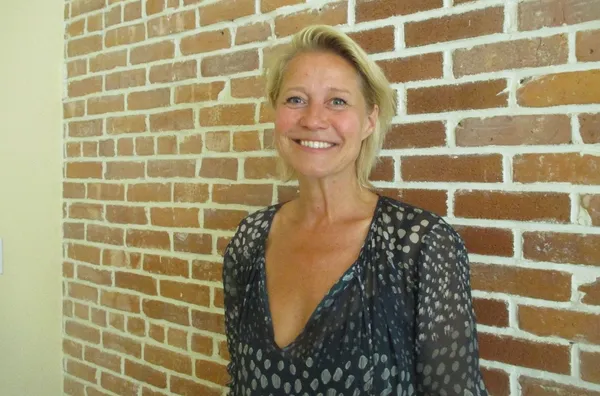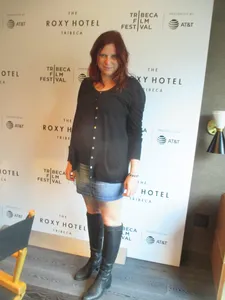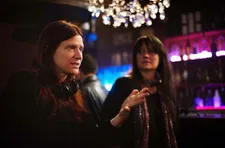 |
| Susanna Nicchiarelli on Trine Dyrholm, the star of Thomas Vinterberg's Festen and The Commune: "I wanted to work with her because she's one of my favourite actresses." Photo: Anne-Katrin Titze |
In the second half of my conversation with Nico, 1988 director/screenwriter Susanna Nicchiarelli at The Roxy Hotel, we discuss how Trine Dyrholm worked on the character, going into the studio to record Nico's songs, the look from costume designers Francesca Vecchi and Roberta Vecchi, and Nico's sense of irony.
Trine Dyrholm will be on this year's Venice International Film Festival jury, headed by Guillermo del Toro along with Nicole Garcia, Taika Waititi, Naomi Watts, Sylvia Chang, Christoph Waltz, Paolo Genovese, and Malgorzata Szumowska.
 |
| Susanna Nicchiarelli on Trine Dyrholm the singer: "We took Nico's songs and went in the studio, she sang them and the character came out of there with the body language." Photo: Anne-Katrin Titze |
Dyrholm as Christa Päffgen gives a fascinating and bold performance in song and words and physicality. Nicchiarelli's extraordinary film, shot beautifully by Crystel Fournier (Céline Sciamma's Girlhood, Tomboy, Water Lilies), focuses in on 1986 and the following years when Nico was working on her solo career, living in Manchester.
Anne-Katrin Titze: Nico really comes alive in your film.
Susanna Nicchiarelli: It's really difficult to do a biopic of a famous person because you end up either celebrating the person which sometimes is very annoying because the audience doesn't necessarily relate to a star. It's difficult to relate to the drugs to all that part. I wanted people to relate with her but to take time.
Slowly and progressively people would learn to love her but not directly. I wasn't going to throw people into her life, that's why I also use the people around her. The irony of working with a person like that. I like to see, especially in the first part of the film, Nico through the other people's eyes.
AKT: Even the conflict about the Marble Index speaks of that. Is it Wordsworth? Is it Coleridge?
SN: It's Wordsworth.
AKT: Yes, it is Wordsworth but Nico doesn't acknowledge it. The person who is in a way serving her cannot really insist although he is right. That is such a fantastic dynamic about power positions and truth and fame. If you're famous enough you can say it's Coleridge, although it isn't.
SN: Yes, it's true.
AKT: Your main actress, Trine Dyrholm, is wonderful. I know her just from the Thomas Vinterberg films, Festen and The Commune.
SN: Trine, I don't know if you know this, but she was a singer when she was very young, when she was 15, 16.
 |
| Susanna Nicchiarelli with Trine Dyrholm on set: "They took away the myth from the past and she joked about it. That's something I love about Nico's character." |
AKT: I did not know this.
SN: She participated in the Eurovision contest. She arrived, I think, second with her song. She did three or four albums and one of her songs was a huge hit in Denmark. She was pop Eighties music, but she has a great voice. I wanted to work with her because she's one of my favourite actresses.
I think she's brilliant and when I learned that she was also a singer it was perfect because we could work on the songs. That's how we worked on the character. We took Nico's songs and went in the studio, she sang them and the character came out of there with the body language.
AKT: The clothes were well chosen. They made a lot of sense and weren't parodistic, from the boots to the scarves.
SN: We were working on how Nico dressed usually. The costume designers [?Francesca Vecchi and Roberta Vecchi?] had a huge documentation on that. But at the same time with Trine we decided we were not going to imitate Nico in any way. So we had to create our own Nico. We picked the clothes that were right for Trine.
AKT: That's what it felt like. It felt right.
SN: Sometimes the problem in biopics is the imitation and you have the audience think the whole time about the imitation.
AKT: Your film is really about the question of what matters and what doesn't matter.
 |
| Magnolia Pictures presents Nico, 1988 A Tribute on August 2, 2018 at (Le) Poisson Rouge in New York |
SN: I think that was one of the questions I was asking myself when I wrote the script; what really matters when you're telling the story of somebody's life. Because the journalists who asked her about The Velvet Underground they would have told that story. But the point is that story was not important for her. It was important of course but not as much as other experiences that really formed her.
AKT: You have that great horrible interview in the film, which everybody who does an interview, as I am doing now, can respond to. It shows what not to do.
SN: Which interview do you mean?
AKT: The radio interview early on, where she is being asked the most banal, stupid questions.
SN: And the sentence "That must have been the best period of your life." That comes from a real interview and she answers "We took a lot of LSD.'" I love that because she was ironic and over time they tried to make her nostalgic. All the time they tried to make her think over about the past, she took away the myth.
They took away the myth from the past and she joked about it. That's something I love about Nico's character. That's the proof that she had a very particular intelligence and irony in treating things.
Read what Susanna Nicchiarelli had to say on finding inspiration, a different kind of beauty, and why she made Nico, 1988.
Nico, 1988 is screening at Film Forum in New York. Trine Dyrholm will participate in a Q&A following the 8:10pm screening on Friday, August 3.





















